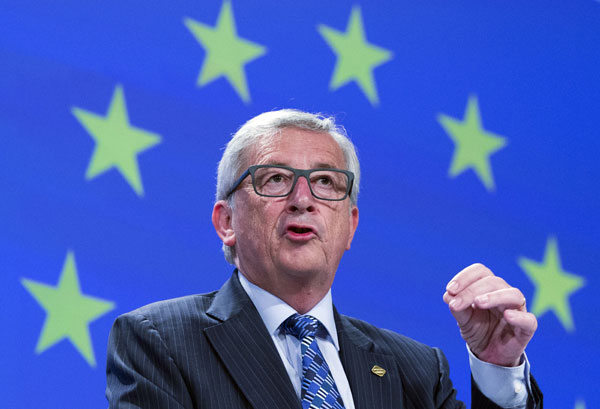China's valuable support for a strong eurozone
(China Daily) Updated: 2015-07-01 07:54
 |
|
European Commission President Jean-Claude Juncker gives a statement on the situation on the situation in Greece, at the EU commission headquarters in Brussels, Belgium June 29, 2015.[Photo/Agencies] |
Knotty as it is, the unfolding Greek debt crisis is by no means unsolvable as long as confidence in a united and prosperous European Union and strong euro can prevail.
This is a key message visiting Chinese Premier Li Keqiang delivered to top EU leaders in Brussels on Monday.
At a crucial moment when pessimism has brought the Greek crisis to such a head that the country is closer to a default on its debt repayments than ever, Li offered a spark of enthusiasm to restart the stalled talks by calling on Greece and its creditors to reach a last-minute deal that will allow Greece to remain in the eurozone.
Given the escalation of the country's crisis over the weekend sent a shock wave through the global stock markets on Monday, there are ample reasons to worry about the uncertainties surrounding the events in Greece and the effect a default would have on Europe, relations between China and the EU, global financial stability and the nascent global economic recovery.
Greece has announced that it will hold a referendum on a bailout plan proposed last week by the country's creditors. In response, Greece's eurozone partners have refused to extend the country's bailout program and the European Central Bank capped its emergency support for the country's banks. A real danger now looms of Greece exiting the euro, which might derail the global economic recovery and damage the long-term viability of the euro as a currency.
However, such a tragedy is neither certain nor unavoidable.
The EU should shoulder its responsibility to prevent the Greek crisis from overshadowing the fragile global recovery.
As a major customer and supplier of the 28-nation EU, and a responsible long-term holder of Eurobonds, China's confidence in and commitment to a strong eurozone offers EU leaders the necessary support to look at the Greek crisis from a broader and longer perspective.
When Li said that China will not only consider a China-EU investment platform to back European Commission President Jean-Claude Juncker's plan to revive the European economy, but also buy more bonds issued by the European Investment Bank, EU leaders should be clear that China wants to see the EU maintain its integrity and a forward trajectory.
Such a confidence-building effort is particularly valuable, especially from such a large country as China which already has a huge stake and seeks to further expand it in a strong eurozone. It will be a tragedy to allow inaction over the Greek crisis to stand in the way of growth-boosting Sino-EU cooperation.











